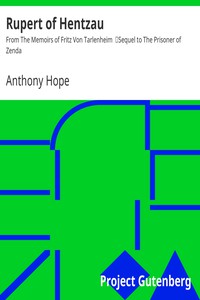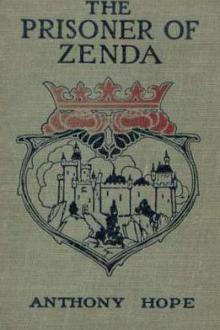Rupert of Hentzau: From The Memoirs of Fritz Von Tarlenheim<br />Sequel to The Prisoner of Zenda, Anthony Hope [top 10 most read books in the world TXT] 📗

- Author: Anthony Hope
Book online «Rupert of Hentzau: From The Memoirs of Fritz Von Tarlenheim<br />Sequel to The Prisoner of Zenda, Anthony Hope [top 10 most read books in the world TXT] 📗». Author Anthony Hope
“The deuce he is! He said nothing of going to Strelsau. He rose early and rode off with Herbert, merely saying they would be back to-night.”
“He went to Strelsau, sir. I am just from Zenda, and his Majesty is known to have been in town with the queen. They were both at Count Fritz’s.”
“I’m much interested to hear it. But didn’t the telegram say where Herbert was?”
Simon laughed.
“Herbert’s not a king, you see,” he said. “Well, I’ll come again to-morrow morning, for I must see him soon. He’ll be back by then, sir?”
“Yes, Simon, your brother will be here to-morrow morning.”
“Or what’s left of him after such a two-days of work,” suggested Simon jocularly.
“Why, yes, precisely,” said Sapt, biting his moustache and darting one swift glance at James. “Or what’s left of him, as you say.”
“And I’ll bring a cart and carry the boar down to the castle at the same time, sir. At least, I suppose you haven’t eaten it all?”
Sapt laughed; Simon was gratified at the tribute, and laughed even more heartily himself.
“We haven’t even cooked it yet,” said Sapt, “but I won’t answer for it that we sha’n’t have by to-morrow.”
“All right, sir; I’ll be here. By the way, there’s another bit of news come on the wires. They say Count Rupert of Hentzau has been seen in the city.”
“Rupert of Hentzau? Oh, pooh! Nonsense, my good Simon. He daren’t show his face there for his life.”
“Ah, but it may be no nonsense. Perhaps that’s what took the king to Strelsau.”
“It’s enough to take him if it’s true,” admitted Sapt.
“Well, good day, sir.”
“Good day, Simon.”
The two huntsmen rode off. James watched them for a little while.
“The king,” he said then, “is known to be in Strelsau; and now Count Rupert is known to be in Strelsau. How is Count Rupert to have killed the king here in the forest of Zenda, sir?”
Sapt looked at him almost apprehensively.
“How is the king’s body to come to the forest of Zenda?” asked James. “Or how is the king’s body to go to the city of Strelsau?”
“Stop your damned riddles!” roared Sapt. “Man, are you bent on driving me into it?”
The servant came near to him, and laid a hand on his shoulder.
“You went into as great a thing once before, sir,” said he.
“It was to save the king.”
“And this is to save the queen and yourself. For if we don’t do it, the truth about my master must be known.”
Sapt made him no answer. They sat down again in silence.
There they sat, sometimes smoking, never speaking, while the tedious afternoon wore away, and the shadows from the trees of the forest lengthened. They did not think of eating or drinking; they did not move, save when James rose and lit a little fire of brushwood in the grate. It grew dusk and again James moved to light the lamp. It was hard on six o’clock, and still no news came from Strelsau.
Then there was the sound of a horse’s hoofs. The two rushed to the door, beyond it, and far along the grassy road that gave approach to the hunting-lodge. They forgot to guard the secret and the door gaped open behind them. Sapt ran as he had not run for many a day, and outstripped his companion. There was a message from Strelsau!
The constable, without a word of greeting, snatched the envelope from the hand of the messenger and tore it open. He read it hastily, muttering under his breath “Good God!” Then he turned suddenly round and began to walk quickly back to James, who, seeing himself beaten in the race, had dropped to a walk. But the messenger had his cares as well as the constable. If the constable’s thoughts were on a crown, so were his. He called out in indignant protest:
“I have never drawn rein since Hofbau, sir. Am I not to have my crown?”
Sapt stopped, turned, and retraced his steps. He took a crown from his pocket. As he looked up in giving it, there was a queer smile on his broad, weather-beaten face.
“Ay,” he said, “every man that deserves a crown shall have one, if I can give it him.”
Then he turned again to James, who had now come up, and laid his hand on his shoulder.
“Come along, my king-maker,” said he.
James looked in his face for a moment. The constable’s eyes met his; and the constable nodded.
So they turned to the lodge where the dead king and his huntsman lay. Verily the fate drove.
CHAPTER XVI. A CROWD IN THE KONIGSTRASSE
The project that had taken shape in the thoughts of Mr. Rassendyll’s servant, and had inflamed Sapt’s daring mind as the dropping of a spark kindles dry shavings, had suggested itself vaguely to more than one of us in Strelsau. We did not indeed coolly face and plan it, as the little servant had, nor seize on it at once with an eagerness to be convinced of its necessity, like the Constable of Zenda; but it was there in my mind, sometimes figuring as a dread, sometimes as a hope, now seeming the one thing to be avoided, again the only resource against a more disastrous issue. I knew that it was in Bernenstein’s thoughts no less than in my own; for neither of us had been able to form any reasonable scheme by which the living king, whom half Strelsau now knew to be in the city, could be spirited away, and the dead king set in his place. The change could take place, as it seemed, only in one way and at one cost: the truth, or the better part of it, must be told, and every tongue set wagging with gossip and guesses concerning Rudolf Rassendyll and his relations with the queen. Who that knows what men and women are would not have shrunk from that alternative? To adopt it was to expose the queen to all or nearly all the peril she had run by the loss of the letter. We indeed assumed, influenced by Rudolf’s unhesitating self-confidence, that the letter would be won back, and the mouth of Rupert of Hentzau shut; but enough would remain to furnish material for eager talk and for conjectures unrestrained by respect or charity. Therefore, alive as we were to its difficulties and its unending risks, we yet conceived of the thing as possible, had it in our hearts, and hinted it to one another—my wife





Comments (0)